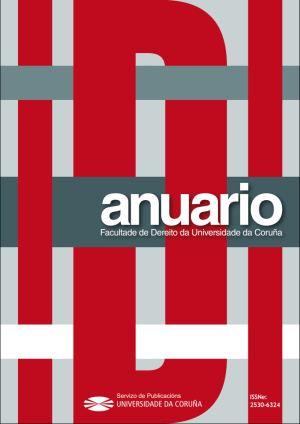El derecho a la educación digital en España. Regulación jurídica e importancia para la preservación del estado democrático de Derecho
Contido principal do artigo
DOI:
https://doi.org/10.17979/afdudc.2021.25.0.8800Resumo
El uso de ingenios tecnológicos, su capacidad disruptiva y condicionante de la vida en sociedad son las notas caracterizadoras de la era digital. Junto a las indudables ventajas y comodidades que los avances técnicos posibilitan, han de afrontarse los riesgos y efectos que el cambio de paradigma social ha generado. Frente a los cambios acontecidos, y los que estén por venir, la educación es un elemento estratégico, no solo por la capacitación técnica de la ciudadanía, sino, sobre todo para asegurar la pervivencia de las democracias constitucionales. En efecto, es preciso que la educación en la era digital incluya la formación en los valores republicanos sobre los que los estados democráticos se asientan. Con esas coordenadas como referencia, se analiza la regulación española del derecho a la educación digital en la LOPDGDD.
##plugins.themes.default.displayStats.downloads##
Detalles do artigo
Citas
AA.VV., La revolución tecnológica y sus efectos en el mercado de trabajo. Un reto del siglo XXI MELLA MÉNDEZ, L. (dir.) y VILLALBA SÁNCHEZ, A. (coord.), La Ley-Wolters Kluwer, Madrid, 2018.
ALÁEZ CORRAL, B., «Artículo 27. El derecho a una educación democrática, libre y plural», en MONTESINOS PADILLA, C. (coord.), PÉREZ TREMPS, P. y SÁIZ ARNAIZ, A. (dirs.), Comentario a la Constitución Española: 40 aniversario 1978-2018: Libro-homenaje a Luis López Guerra (Vols. 1 (Tomo I, Preámbulo a artículo 96), Tirant lo Blanch, Valencia, 2018, págs. 601-619.
ÁLVAREZ ROBLES, T., «Derechos digitales: especial interés en los derechos de acceso a Internet y a la ciberseguridad como derechos constitucionales sustantivos», en DUEÑAS CASTRILLO, A. I., FERNÁNDEZ CAÑUETO, D., MORENO GONZÁLEZ, G. (coords.), Juventud y constitución: un estudio de la Constitución española por los jóvenes en su cuarenta aniversario, Fundación Manuel Giménez Abad de Estudios Parlamentarios y del Estado Autonómico, Zaragoza, 2018, págs. 135-158.
BALAGUER CALLEJÓN, F., «Redes sociales, compañías tecnológicas y democracia», en Revista de Derecho Constitucional Europeo, Nº 32, 2019, págs. 107-128.
BALLESTEROS-SORIANO, A., «Tecnología digital: ¿realidad aumentada o deformada?», en Cuadernos electrónicos de filosofía del derecho, Nº 42, 2020, págs. 24-42.
BERNERS-LEE, T., Tejiendo la red, Siglo Veintiuno, Madrid, 2000.
CARR, N. G. (2011). Superficiales: ¿Qué está haciendo Internet con nuestras mentes?, Taurus, Madrid, 2011.
CERDÁ GARCÍA, D., «El mito de la natividad digital», en Disentia, publicación de 22 de enero de 2021, accesible en: https://disidentia.com/el-mito-de-la-natividad-digital/.
GARCÍA ARETIO, L., «Necesidad de una educación digital en un mundo digital», en RIED: revista iberoamericana de educación a distancia, Vol. 22, Nº 2, 2019, págs. 9-22.
HAN, B.-C, La sociedad de la transparencia, Herder, Barcelona, 2013.
HAN, B.-C., En el enjambre, Herder, Barcelona, 2014.
HOFFMAN-RIEM, W., Big Data. Desafíos también para el Derecho, Aranzadi-Thomson Reuters, Navarra, 2018.
LASALLE, J., Ciberleviatán, Arpa, Barcelona, 2019.
MARTÍNEZ MARTÍNEZ, R., «Transformación digital y diseño orientado a la privacidad en la Universidad», en RUIDERAe, Revista de Unidades de Información, Nº 13, 2018, págs. 1-26.
MORENO GONZÁLEZ, G., La Democracia Humanista, Athenaica, Sevilla, 2020.
ORDINE, N., La utilidad de lo inútil, Acantilado, Barcelona, 2013.
QUADRA-SALCEDO FERNÁNDEZ DEL CASTILLO, T., «Retos, riesgos y oportunidades de la sociedad digital», en QUADRA-SALCEDO, T. y PIÑAR MAÑAS, J. L. (dirs.), BARRIO ANDRÉS, M. y TORREGROSA VÁZQUEZ, J. (coords.), Sociedad Digital y Derecho, Boletín Oficial del Estado, Madrid, 2018, págs. 21-85.
QUADRA-SALCEDO FERNÁNDEZ DEL CASTILLO, T., «Derechos fundamentales, democracia y mercado digital», en Derecho digital e Innovación, Enero-Marzo, Nº 1, 2019.
LEATON GRAY, S., «Artificial intelligence in schools: Towards a democratic future», en London Review of Education, Vol. 18, Nº 2, págs. 163-177.
RALLO LOMBARTE, A., «Del derecho a la protección de datos a la garantía de nuevos derechos digitales», en RALLO LOMBARTE, A. (dir.), Tratado de protección de datos, Tirant lo Blanch, Valencia, 2019, págs. 23-52.
REBOLLO DELGADO, L., y ZAPATERO MARTÍN, P., Derechos Digitales, Dykinson, Madrid, 2019.
REQUEJO PAGÉS, J. L., «"De la esencia y valor de la democracia", cien años después», en Revista Española de Derecho Constitucional, Año 40, Nº 118, 2020, págs. 309-317.
ROBLES, J. M., “¿Por qué la brecha digital es un problema social?”, en Panorama social, Nº 25, 2017, págs. 9-16.
RODOTÀ, S., Il mondo nella Rete. Quali i diritti, quali i vincoli, 6ª ed., Laterza, Roma, 2019.
SCHWAB, K., La cuarta revolución industrial, Debate, Barcelona, 2016.
SUÁREZ GONZALO, S., «Tus likes ¿tu voto? Explotación masiva de datos personales y manipulación informativa en la campaña electoral de Donald Trump a la presidencia de EEUU 2016», en Quaderns del CAC, Nº 44, 2018, págs. 27-36.
VAN DER LAAT ULLOA, H., «Revolución Industrial. Una Revolución Técnica», en Revista Estudios, Nº 9, 1991, págs. 66-77.



